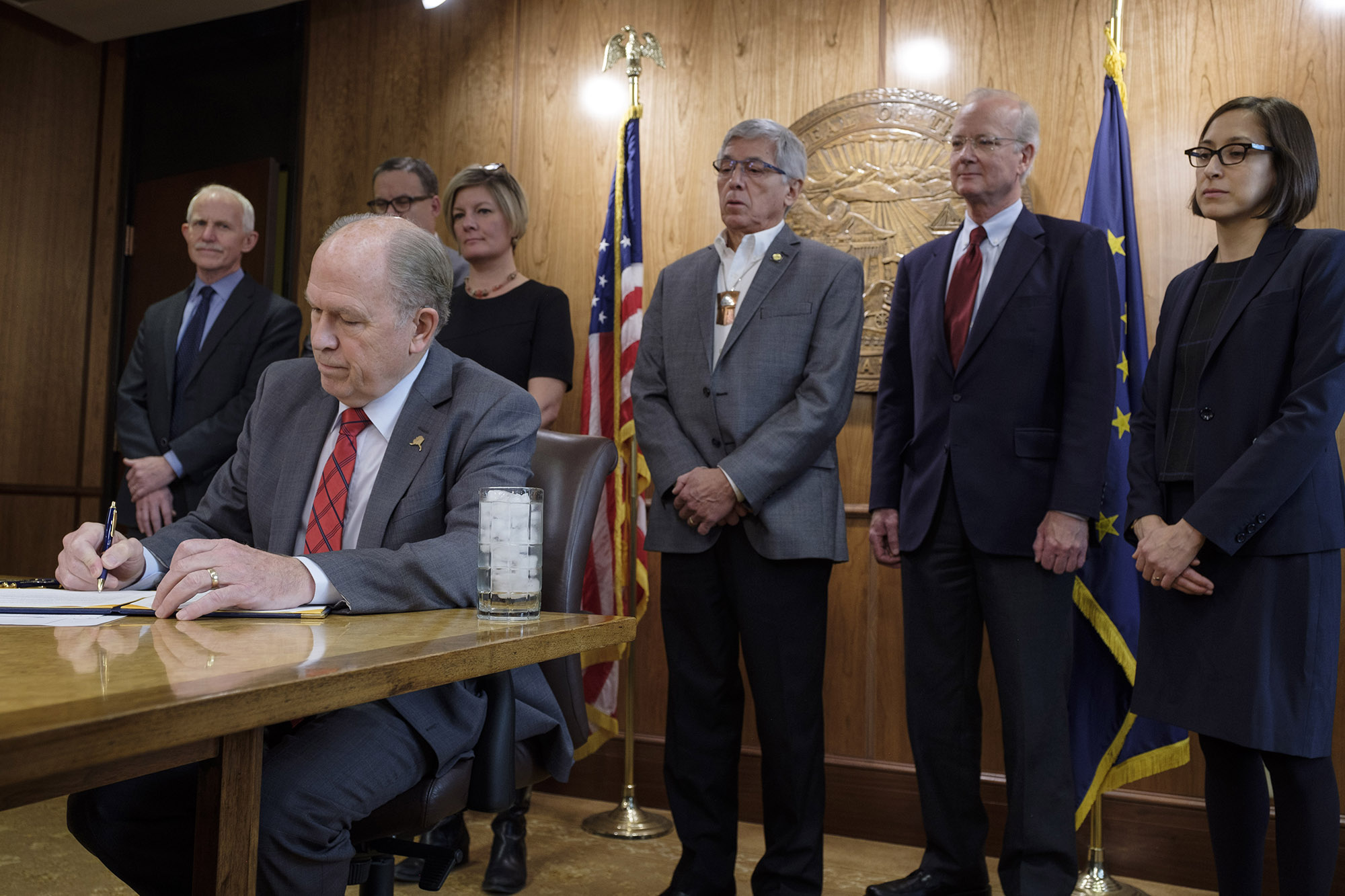In his annual address, Alaska’s governor called for the oil-dependent state to diversify revenue sources
In his state-of-the-state address Thursday, Alaska Gov. Bill Walker called on lawmakers to consider a adding payroll tax and using earnings from the state's sovereign wealth fund.

Even as he celebrated news that North Slope oil production has ticked up for two consecutive years and that the Arctic National Wildlife Refuge may soon open for drilling, Alaska Gov. Bill Walker cautioned in his state-of-the-state address that the days of near-complete dependence on oil revenues are gone.
Oil revenues once provided about 90 percent of the money Alaska needed to run state government, Walker said in his Thursday night address to the legislature. Now, with production at only about a quarter of the peak levels reached in the 1980s, oil revenues provide only about 30 percent of what is needed for operations, he said.
Although there is new activity in the oil industry, oil “is no longer the sole answer,” he said in his speech. “We must diversify our portfolio.”
The most promising opportunity to accomplish diversification is the “accelerated momentum to develop our huge natural gas reserves,” Walker said.
He cited the joint development agreement signed in China in November to promote the commercialization of now-stranded North Slope natural gas reserves.
“Nothing on Alaska’s horizon has greater potential to fuel and propel our prosperity than this opportunity,” he said.
The agreement with the government and institutions in China is more profound than past joint statements in favor of the long-desired natural gas project, Walker said.
“First time in the project’s history, we are working directly with the markets,” he said. China offers some of the world’s biggest markets and players, has a population of 1.4 billion that “wants Alaska’s clean-burning gas,” and the project has the full support of the presidents of the U.S. and China. “Both leaders now have a vested interest in success,” he said.
But the immediate fiscal needs are pressing, and Walker criticized lawmakers for failing to find a long-term fiscal restructuring. In the past three years, he said, the state has drained $14 billion of its savings to patch budget holes. Now the state has run out of those savings, he said.
Walker made a pitch for new sources of revenue for state operations — a payroll tax, capped at 1.5 percent of wages and expiring in three years, and some use of earnings from the Alaska Permanent Fund, the state’s sovereign fund created with oil revenues. Walker has submitted legislation for the payroll tax. In his speech, he noted that Alaska is the only U.S. state without either a state income tax or sales tax.
Though Alaska benefits from oil development, it needs to address the fact that it is “ground zero” for climate change, said Walker, who last fall established a climate change strategy and appointed a task force on the issue.
“Retreating sea ice and glaciers and thawing permafrost are not partisan issues. They are social, environmental and economic ones,” he said.
Walker referred to Chris Apassingok, a teenager and whaler from the Gambell, on St. Lawrence Island in the Bering Strait region. Apassingok spoke at last fall’s Alaska Federation of Natives Elders and Youth Conference about climate change and the challenges it is creating for indigenous people of the Arctic.
“Storms are more frequent; they’re more intense. The ice is more fragile and takes longer to arrive each year. Hunters must now travel more than 100 miles to find the whales and walrus they used to harvest just offshore,” Walker said. “The impacts of climate change are evident throughout Alaska, and they must be addressed in the context of a healthy resource-extraction economy.”
House Speaker Bryce Edgmon, in a news conference held after Walker’s speech, said the governor had shown courage and was tackling some difficult challenges. Alaska has the “dubious distinction” of being the state with the largest long-term deficit in the nation, he said, so “we have to make those tough choices.”